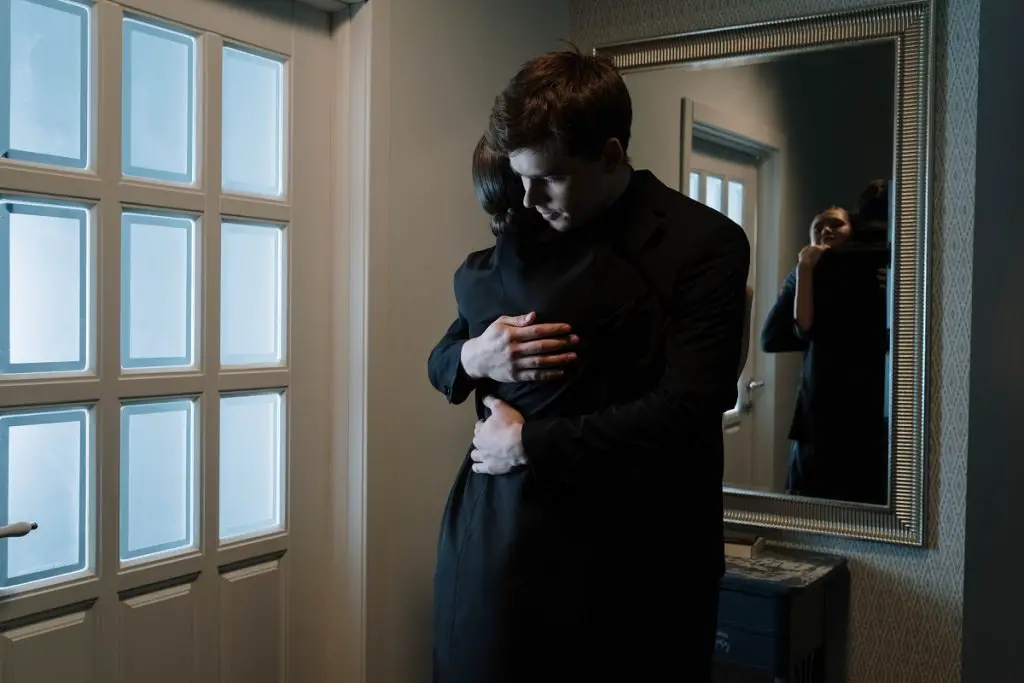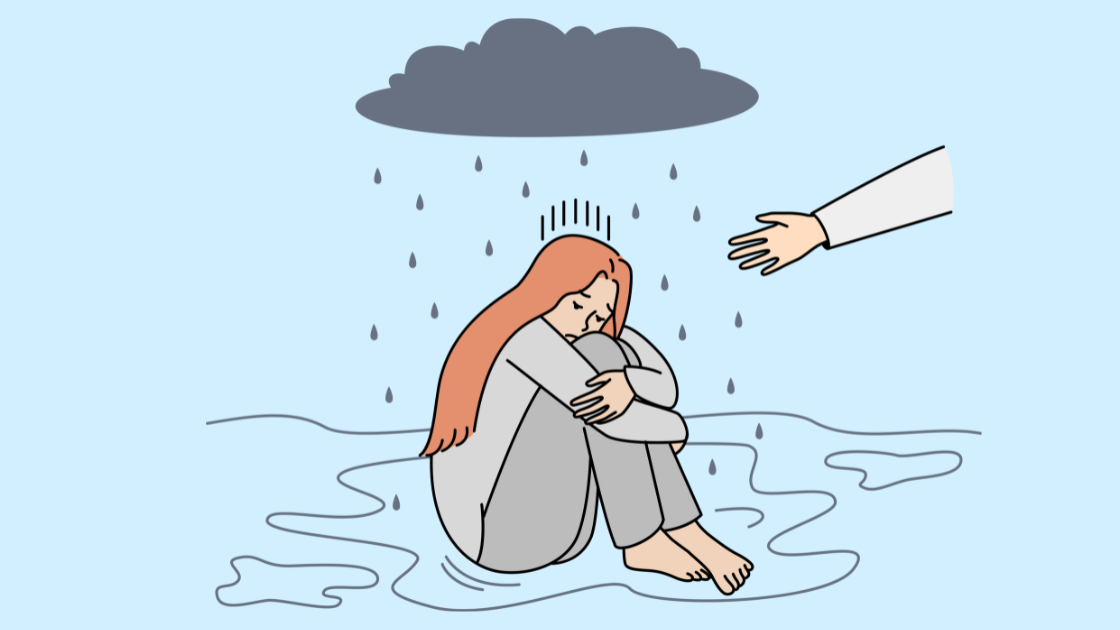Grief has many stages that can impact the mind and body. Research shows that there are many types of grief, with more stages than the classic 5 stages (Denial, Anger, Bargaining, Depression, Acceptance) popularized by Elizabeth Kübler-Ross. Even if the sadness from death never passes, you can learn how to manage it.
Whether it is you who are grieving or if you are worried about someone else who has suffered a loss, grief is a very complicated process. There are many stages of grief, and whether you focus on the five, seven, or twelve stages of grief model, no two people go through them in an identical manner.

Table of Contents
How Many Stages Of Grief Are There?
Many different models explain the different types of grief and the stages encompassed by these stages. Elizabeth Kübler-Ross coined the classic five stages of grief: denial, anger, bargaining, depression, and acceptance. Let’s dig into those a bit:
- Denial: This makes sense, doesn’t it? Even if you are expecting your loved one to pass away soon, either of old age or due to an extenuating illness, you experience some denial because, let’s face it, normal grief is complicated. I just don’t believe he died.
- Anger: Whether you get angry with a higher being, whether that is God, Allah, or someone else, or your anger is directed at the loved one who left you behind, anger is a normal feeling. One of the very normal grief reactions is to be angry. How dare he die?
- Bargaining: Sometimes people try to make a deal with a higher power, and other times it is with themselves. Bargaining often accompanies the grief experience. If only I’d been kinder or more accommodating to him… Or Take me, God, not my baby….
- Depression: The fourth stage of grief in this model is depression. A typical emotional response, depression can quickly and easily become something far more serious accompanied by both emotional and physical signs of grief. I am overwhelmed with sadness that he died.
- Acceptance: Eventually, whether it happens naturally through the grief process or after grief therapy, people hopefully hit acceptance. You accept that death is inevitable since none of us lives forever, and you are starting to accept and move forward. I wish he were here, but life goes on!
Her colleague and co-author David Kessler released a book after her death that presented their theory that a sixth stage of grief – finding meaning – was the next step after acceptance.
Later in her career, Kübler-Ross came to believe that the stages of grief also applied to other losses, transitions, and changes people experience. Life events such as loss of a relationship or loss of a job, moving to a new school or a new city, aging, and isolation for months can plunge a person into grief.
While she died long before the recent pandemic, her work is relevant in assessing its impact. Kessler noted that many grieved the loss of their “normal” daily activities after an extended period of time social distancing and staying home. The unexpected loss hit many people hard, to the point that substance abuse and suicidal thoughts became more common.

More Theories On TheThe Grieving Process
Neither Kübler-Ross nor Kessler implied that all people experience grief as they saw it among hospital patients or that they go through a linear process of moving from stage to stage. Yet, their work was criticized by colleagues as not being rigorously researched. The concepts they presented still resonate with many, even though other researchers have advanced new theories with more stages of grief.
There are often two more stages of grief added to the feelings of loss that accompany losing a loved one. Those two additional stages are processing grief and shock.
- Shock: Shock happens right when you suffer the loss. Sometimes when someone is experiencing profound shock as a culmination of their feelings of grief, their friends are surprised by that because the death was “expected.” If you have experienced a loss, you know all too well that even a death you know is coming can leave you shocked. Losses that are truly a big surprise can also bring about traumatic grief.
- Processing Grief: As you work through the stages of grief, there comes a point when you are processing the grief. Whether this is on your own, with a support group, through grief counseling, or from talking to friends and loved ones, processing has to happen.
Some specialists refer to the twelve stages of grief instead of limiting it to just 5 or 7. A deep dive into the 12 stages shows that there is certainly overlap.
- Healing takes time.
- Grief is universal yet individual. In other words, everyone grieves, but it is different for everyone.
- Shock is often the first response to the grieving process.
- Grief can, and often does, cause depression.
- Grief can cause health problems. This can be physical ailments, mental health concerns, substance abuse, etc.
- Panic might happen.
- Sometimes grief causes guilt.
- Grief can bring about anger.
- Expect to experience intense emotions.
- Grief often causes a lack of direction and purpose.
- Hope can bring about healing, and healing can bring hope.
- Acceptance means acknowledging that losing a loved one has changed you but not defeated you.

Are There Different Types Of Grieving?
There are many different types of grief. Some of the various types of grief are:
- Normal Grief: According to mental health professionals, normal grief following a significant loss lasts anywhere from six months to two years.
- Collective Grief: When an entire community, country, or world experiences grief, it is collective grief. An example of this is when a small town loses children through school shootings such as Sandy Hook or Uvalde, and the whole town and country grieved together. Another example was after the 9/11 terrorist attacks when the world felt the loss.
- Cumulative Grief: When you suffer multiple losses, you are experiencing cumulative grief. Medical care workers on the front lines during the Covid-19 pandemic experienced this type of grief as patients and family members died. Another example is when a natural disaster strikes and people are battling to find injured people and uncover people who have died.
- Prolonged Grief: If you suffer a loss and have a prolonged desire for that person to come back that overtakes your overall life, that can be prolonged grief. It is natural to want your loved one back, but it can’t become an obsession.
- Absent Grief: In light of a loss, if you do not feel what most people feel is a normal grief response, you might be experiencing absent grief. Although every person experiences grief differently, it is important to let the feelings happen. As someone on the outside looking in, please remember that just because someone does not appear to be grieving how you would expect them to does not mean they are not grieving.
- Disenfranchised Grief: If you feel like you are deeply grieving in a situation that others might not expect you to, this is disenfranchised grief. Perhaps the person was not close to you, or you lost a beloved pet. Anytime you think others are not acknowledging the extent of your loss, that is disenfranchised grief.
- Anticipatory Grief: When you know that someone is likely to pass away, such as when a loved one faces a terminal illness, you can have anticipatory grief.
- Complicated Grief: It is possible to grieve over someone you don’t particularly like or with whom you had a very complex relationship. When someone loses a former spouse, for example, they might have intense, complicated grief.
- Delayed Grief: Delayed grief does not hit right away. You might be going along in normal life thinking you are over it when you get hit suddenly with intense waves of loss.
- Chronic Grief: Have you been grieving for a long time, and rather than an ebb and flow of loss, you feel it deeply and intensely all the time? That is chronic grief, and you might need to seek grief support in the form of professional help.

What Are The Symptoms Of Grief?
Symptoms of grief can be physical and emotional. You might experience intense sorrow and sadness that might be accompanied by crying that may be uncontrollable at times. Physical symptoms can come in the form of a stomach ache, headache, or inability to eat. Nausea can accompany trying to eat normally.
A friend who lost her father at 19 from an expected heart attack had phantom chess pains around the anniversary of his death every year for 40 years.
A grieving person might feel tired and unable to perform normal daily tasks. He or she might appear pale and unkempt.
Emotional symptoms can include an inability to focus on tasks, sleep and make decisions. Sometimes a grieving person will defer to whatever you suggest because even simple daily tasks seem overwhelming.
What Is The Most Common Type Of Grief?
Normal grief is the most common form of grief. Anytime someone suffers a loss, you expect certain things to occur. Friends and family members are expected to be sad and a bit lost for a while following the loss of a loved one.
When it gets more concerning is if it becomes a hindrance to the individual carrying on with normal daily tasks long after the funeral is over. While some grief symptoms continue for months, you should see glimpses of the person your friend was before the loss within a couple of weeks or months.

How Can You Resolve Grief?
There are many ways to resolve grief. The first is to give it time. We will not insult you with the phrase, “time heals all wounds.” However, the passage of time can lessen the pain and shock of the loss.
Some people find comfort in talking about the person they lost. This can be in an informal setting like talking to friends and loved ones or attending a grief support group. If your grief seems to be interfering with everyday life after a month or so, consider getting some professional help.
There is no shame in seeking assistance in processing a great loss in your life. Please don’t see asking for help as a sign of weakness.
One big thing to remember is that while there is normal grief, not everyone experiences grief differently. Be patient with yourself.

